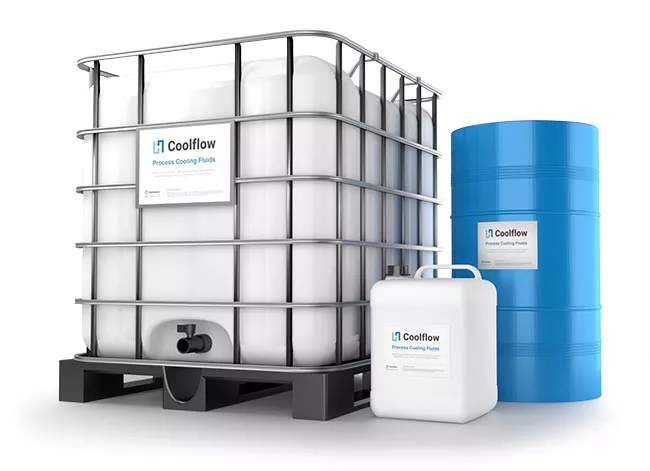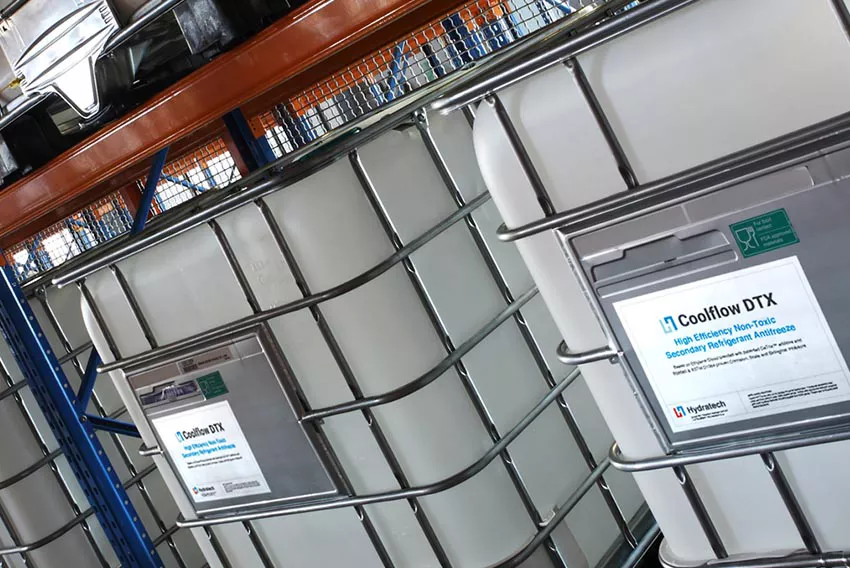Coolflow DTX®
A non-toxic fully inhibited heat transfer fluid, with antifreeze function based on detoxified ethyelne glycol.
More about Coolflow DTX®Kent based AGA, provide fruit storage services to a number of major UK retailers. They have the capacity to store over 7,500 bins totalling around 2,500 tonnes. Cold Storage facilities are provided for the short-term storage of top fruit (below 3°C) - for longer term storage, fruit is stored in a refrigerated low oxygen-controlled atmosphere to reduce degradation.
AGA’s secondary cooling system had historically been charged with a salt brine secondary refrigerant, Orchard suspected they were looking at a significant corrosion issue.
Consultants, design engineers and installers are more than aware of the potential pitfalls of a salt brine based cooling system. While salt brine could be perceived as a cost-effective solution initially, it can be the cause of expensive (potentially catastrophic) failures at the 10-15 year mark. Considered to be the high maintenance option, salt brines are particularly corrosive if they are not kept in check. Recommended corrosion inhibitors must be added and monitored (along with pH levels) on a regular basis to prevent an acid condition from occurring in the system.
The full extent of the damage to system components became evident following a system drain-down, with strainer and isolating valves being particularly corroded and in need of replacing.
The damaged internal working parts of the circuit were swapped out and Orchard recommended charging the cooling system with Hydratech’s Coolflow DTX® for stability and to maintain efficiencies.
Formulated as a glycol-based antifreeze rather than salt based, inhibited Coolflow DTX® has low corrosivity and improves fluid reliability and system longevity. DTX was introduced in 2010 as a high performance non-toxic secondary refrigerant, suitable for replacing Propylene Glycol and salt brines in food and cold storage cooling systems.
Performance wise, DTX has very similar heat transfer and pumping characteristics to Ethylene Glycol and subsequently benefits from numerous operating advantages such as low viscosity, low dose rates and smaller systems and plant footprints onsite.
To prevent internal corrosion, scaling and biological fouling, all fluids in the Hydratech Coolflow® range are formulated with multi-metal and multi-function inhibitors (which exceed ASTM & BS corrosion standards).
Orchard’s engineers flushed the system with clean water several times to achieve a neutral pH and introduced the DTX. As a result of the upgrade from salt brine to DTX Glycol, Orchard anticipate a more durable system with potential operational cost savings and effective long-life inhibitor protection.
For more information on Hydratech’s Coolflow® range click here
Regular analysis can extend the life of both fluid and system. Hydratech’s Fluid Monitoring Program (FMP) is a very straight forward, effective way to proactively monitor closed-loop system condition.

A range of fully inhibited heat transfer fluids, with antifreeze function, for use in all RAC, HVAC and glycol chiller systems.
More about Coolflow

If you need help or advice on selecting the most suitable product for your needs call one of our sales engineers today. With experience across many industry sectors we can help you find the most cost effective solution whilst meeting all your technical re
Call today on (860) 653-1691
Sorry, we need you to complete all the required fields before we can process your enquiry.